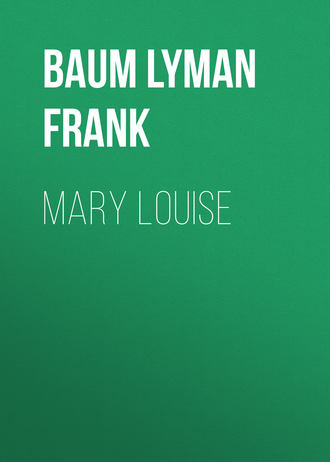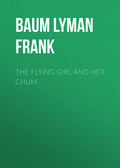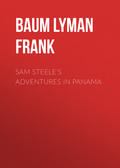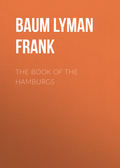
Лаймен Фрэнк Баум
Mary Louise
CHAPTER XXII
THE FOLKS AT BIGBEE'S
Mr. Conant decided to take the Friday morning train back to Dorfield, saying it would not be possible for him to remain at the Lodge over Sunday, because important business might require his presence in town.
"This demise of Mrs. Burrows," he said confidentially to his wife in the privacy of their room, "may have far-reaching results and turn the whole current of Colonel Weatherby's life."
"I don't see why," said Aunt Hannah.
"You're not expected to see why," he replied. "As the Colonel is my most important client, I must be at the office in case of developments or a sudden demand for my services. I will tell you one thing, however, and that is that this vacation at Hillcrest Lodge was planned by the Colonel while I was in New York, with the idea that he and Mrs. Burrows would come here secretly and enjoy a nice visit with Mary Louise."
"You planned all that, Peter!"
"Yes. That is, Weatherby planned it. He knows Will Morrison well, and Will was only too glad to assist him; so they wired me to come to New York, where all was quickly arranged. This place is so retired that we considered it quite safe for the fugitives to come here."
"Why didn't they come, then?"
"Two reasons prevented them. One was the sudden breaking of Mrs. Burrows' health; the other reason was the Colonel's discovery that in some way our carefully laid plans had become known to the detectives who are seeking him."
"Good gracious! Are you sure of that, Peter!"
"The Colonel seemed sure. He maintains a detective force on his own account and his spies discovered that Hillcrest is being watched by agents of the Secret Service."
"Dear me; what a maze of deceit!" wailed the good woman. "I wish you were well out of the whole affair, Peter; and I wish Mary Louise was out of it, too."
"So do I, with all my heart. But it's coming to a focus soon, Hannah.
Be patient and it may end better than we now fear."
So Bub drove Mr. Conant to Millbank and then the boy took the car to the blacksmith shop to have a small part repaired. The blacksmith made a bungle of it and wasted all the forenoon before he finally took Bub's advice about shaping it and the new rod was attached and found to work successfully.
It was after one o'clock when the boy at last started for home and on the way was hailed by a stranger – a little man who was trudging along the road with both hands thrust in his pockets.
"Going far?" he asked.
"Up th' mount'n to Hillcrest," said Bub.
"Oh. May I have a lift?"
"How fer?"
"Well, I can't say how far I'll go. I'm undecided. Just came out here for a little fresh air, you know, with no definite plans," explained the stranger.
"Hop in," said Bub and for a time they rode together in silence.
"This 'ere's the Huddle, as we're comin' to," announced the boy. "Ol' Miss' Parsons she sometimes takes boarders."
"That's kind of her," remarked the stranger. "But the air isn't so good as further up the hill."
"Ef ye go up," said Bub with a grin, "guess ye'll hev to camp out an' eat scrub. Nobody don't take boarders, up th' mount'n."
"I suppose not."
He made no demand to be let out at the Huddle, so Bub drove on.
"By the way," said the little man, "isn't there a place called Bigbee's, near here?"
"Comin' to it pretty soon. They's some gals livin' there now, so ye won't care to stop."
"What sort of girls are they?"
"Sort o' queer."
"Yes?"
"Ye bet ye. Come from the city a while ago an' livin' by theyselves.
Someth'n' wrong 'bout them gals," added Bub reflectively.
"In what way?" asked the little man in a tone of interest.
"They ain't here fer nuth'n' special 'cept watchin' the folks at Hillcrest. Them's the folks I belongs to. For four bits a week. They's someth'n' queer 'bout them, too; but I guess all the folks is queer thet comes here from the city."
"Quite likely," agreed the little man, nodding. "Let me out at Bigbee's, please, and I'll look over those women and form my own opinion of them. They may perhaps be friends of mine."
"In thet case," asserted Bub, "I pity ye, stranger. F'r my part, I ain't got no use fer anything thet wears skirts – 'cept one er two, mebbe," he added reflectively. "Most men I kin git 'long with fust-rate; but ef a man ever gits in trouble, er begins cussin' an' acts ugly, it's 'cause some gal's rubbed him crossways the grain er stuck a knife in him an' twisted the blade – so's ter speak."
"You're an observant lad, I see."
"When I'm awake I kain't help seein' things."
"And you're a pastoral philosopher."
Bub scowled and gave him a surly glance.
"What's the use firin' thet high-brow stuff at me?" he asked indignantly. "I s'pose ye think I'm a kid, jes' 'cause I don't do no fancy talkin'."
"I suspect you of nothing but generosity in giving me this ride," said the stranger pleasantly. "Is that Bigbee's, over yonder?"
"Yes."
The little man got out at the point where the Bigbee drive met the road, and walked up the drive toward the house. Agatha Lord was standing at the gateway, as he approached it, and seemed rather startled at his appearance. But she quickly controlled her surprise and asked in a calm voice, as she faced him:
"What's up, O'Gorman?"
"Hathaway's coming here," he said.
"Are you sure?"
"He's in Dorfield to-day, waiting to see Lawyer Conant, who went in on the morning train. Where's Nan?"
"Here, my lord!" said Nan Shelley, stepping from behind a tall shrub. "How are you, partner? I recognized you as you passed the Huddle with the boy."
"Field glasses, eh? There isn't much escapes you, Nan."
"Why didn't you tell me?" asked Agatha reproachfully.
"Why don't you make your own discoveries?" retorted her confederate.
Then, turning to O'Gorman, she continued: "So Hathaway's coming, is he?
At last."
"A little late, but according to program. How have you been getting along?"
"Bored to death," asserted Nan. "Agatha has played the lady and I've done the dirty work. But tell me, why didn't you nab Hathaway at Dorfield?"
O'Gorman smiled a little grimly as he answered:
"I'm not sure, Nan, that we shall nab Hathaway at all."
"Isn't he being shadowed?" with some surprise.
"No. But he'll come here, right enough; and then – "
"And then," she added, as he paused, "the chase of years will come to an end."
"Exactly. We may decide to take him to Washington, and we may not."
She gazed at him inquiringly.
"There are some new developments, then, O'Gorman?"
"I'm inclined to suspect there are."
"Known to the department?"
"Yes. I'm to investigate and use my judgment."
"I see. Then Agatha and I are out of it?"
"Not yet; I'm still depending on your shrewdness to assist me. The office has only had a hint, so far, of the prospective break in the case, but – "
"Oh, yes; I remember now," exclaimed Nan.
"That girl up at Conant's sent a telegram, in a desperate hurry. I suspected it meant something important. Who is she, O'Gorman, and why did the Chief cut under us by planting Sarah Judd in the Conants' household?"
"He didn't. The girl has nothing to do with the Department."
"Then some of you intercepted the telegram?"
"We know what it said," he admitted.
"Come, let's go to the house. I've had no lunch. Can you feed me?"
"Certainly." They turned and walked slowly up the path. Said Nan, musingly: "That Sarah Judd is rather clever, O'Gorman. Is she in Hathaway's pay?"
"I think not," he replied, with an amused chuckle.
Nan tossed her head indignantly.
"Very well; play me for a ninny, if you like," she said resentfully.
"You'll get a heap more out of me, in that way!"
"Now, now," said Agatha warningly, "keep your tempers and don't quarrel. You two are like cats and dogs when you get together; yet you're the two cleverest people in the service. According to your story, Mr. O'Gorman, there's an important crisis approaching, and we'd all like to be able to render a good account of ourselves."
Agatha Lord may have lacked something of Nan's experience, but this speech proved her a fair diplomat. It dispersed the gathering storm and during the rest of that afternoon the three counseled together in perfect harmony, O'Gorman confiding to his associates such information as would enable them to act with him intelligently. Hathaway and Peter Conant could not arrive till the next day at noon; they might even come by the afternoon train. Nan's field glasses would warn them of the arrival and meanwhile there was ample time to consider how they should act.
CHAPTER XXIII
A KISS FROM JOSIE
That evening, as Sarah Judd was sitting in her room reading a book, her work for the day being over, she heard a succession of little taps against her window-pane. She sat still, listening, until the taps were repeated, when she walked straight to the window, drew the shade and threw tip the sash. O'Gorman's face appeared in the opening and the girl put a hand on each of his cheeks and leaning over kissed him full upon his lips.
The man's face, lighted by the lamp from within the room, was radiant. Even the fat nose was beatified by the love that shone in his small gray eyes. He took one of her hands in both of his own and held it close a moment, while they regarded one another silently.
Then he gave a little beckoning signal and the girl turned to slip on a light coat, for the nights were chill on the mountain. Afterward she unfastened her outside door and joined the detective, who passed an arm around her and led her to one of the benches on the bluff.
The new moon was dim, but a sprinkling of stars lit the sky. The man and girl were far enough from the Lodge not to be overheard.
"It's good to see you again, Josie," said O'Gorman, as they seated themselves on the bench. "How do you like being a sleuth?"
"Really, Daddy," she replied, "it has been no end of a lark. I'm dead sick of washing other folks' dishes, I confess, but the fun I've had has more than made up for the hard work. Do you know, Dad, I had a session with Nan Shelley one day, and she didn't have much the best of it, either, although she's quick as a cat and had me backed off the map in every way except for the matter of wits. My thoughts didn't crumble much and Nan was good enough to congratulate me. She knew, as soon as I did, about the letter the crippled girl found in a book, but I managed to make a copy of it, while Nan is still wondering where it is hid. I'm patting myself on the back, Dad, because you trained me and I want to prove myself a credit to your training. It's no wonder, with such a master, that I could hold my own with Nan Shelley!"
He gave a little amused laugh.
"You're all right, Josie dear," he replied. "My training wouldn't have amounted to shucks if you hadn't possessed the proper gray matter to work with. But about that letter," more seriously; "your telegram told me a lot, because our code is so concise, but it also left a good deal to be guessed at. Who wrote the letter? I must know all the details in order to understand it properly."
"It's all down in my private shorthand book," said Josie O'Gorman, "but I've never dared make a clear copy while Nan was so near me. You can't read it, Dad, and I can't read it to you in the dark; so you'll have to wait."
"Have you your notebook here?"
"Always carry it."
He drew an electric storage-lamp from his pocket and shielded the tiny circle of light with his coat.
"Now, then," said he, "read the letter to me, Josie. It's impossible for anyone to see the light from the house."
The girl held her notebook behind the flap of his coat, where the lamp shed its white rays upon it, and slowly read the text of the letter. O'Gorman sat silent for some time after she had finished reading.
"In all my speculations concerning the Hathaway case," he said to his daughter, "I never guessed this as the true solution of the man's extraordinary actions. But now, realizing that Hathaway is a gentleman to the core, I understand he could not have acted in any other way."
"Mrs. Burrows is dead," remarked Josie.
"I know. It's a pity she didn't die long ago."
"This thing killed her, Dad."
"I'm sure of it. She was a weak, though kind-hearted, woman and this trouble wore her out with fear and anxiety. How did the girl – Mary Louise – take her mother's death?"
"Rather hard, at first. She's quieter now. But – see here, Dad – are you still working for the Department?"
"Of course."
"Then I'm sorry I've told you so much. I'm on the other side. I'm here to protect Mary Louise Burrows and her interests."
"To be sure. I sent you here myself, at my own expense, both to test your training before I let you into the regular game and for the sake of the little Burrows girl, whom I fell in love with when she was so friendless. I believed things would reach a climax in the Hathaway case, in this very spot, but I couldn't foresee that your cleverness would ferret out that letter, which the girl Irene intended to keep silent about, nor did I know that the Chief would send me here in person to supervise Hathaway's capture. Mighty queer things happen in this profession of ours, and circumstances lead the best of us by the nose."
"Do you intend to arrest Mr. Hathaway?"
"After hearing that letter read and in view of the fact that Mrs. Burrows is dead, I think not. The letter, if authentic, clears up the mystery to our complete satisfaction. But I must get the story from Hathaway's own lips, and then compare his statement with that in the letter. If they agree, we won't prosecute the man at all, and the famous case that has caused us so much trouble for years will be filed in the office pigeonholes and pass into ancient history."
Josie O'Gorman sat silent for a long time. Then she asked:
"Do you think Mr. Hathaway will come here, now that – now that – "
"I'm quite sure he will come."
"When?"
"To-morrow."
"Then I must warn them and try to head him off. I'm on his side, Dad; don't forget that."
"I won't; and because you're on his side, Josie, you must let him come and be vindicated, and so clear up this matter for good and all."
"Poor Mary Louise! I was thinking of her, not of her grandfather. Have you considered how a knowledge of the truth will affect her?"
"Yes. She will be the chief sufferer when her grandfather's innocence is finally proved."
"It will break her heart," said Josie, with a sigh.
"Perhaps not. She's mighty fond of her grandfather. She'll be glad to have him freed from suspicion and she'll be sorry – about the other thing."
Sarah Judd – otherwise Josie O'Gorman – sighed again; but presently she gave a little chuckle of glee.
"Won't Nan be wild, though, when she finds I've beaten her and won the case for Hathaway?"
"Nan won't mind. She's an old hand at the game and has learned to take things as they come. She'll be at work upon some other case within a week and will have forgotten that this one ever bothered her."
"Who is Agatha Lord, and why did they send her here as principal, with Nan as her maid?"
"Agatha is an educated woman who has moved in good society. The Chief thought she would be more likely to gain the friendship of the Conants than Nan, for poor Nan hasn't much breeding to boast of. But she was really the principal, for all that, and Agatha was instructed to report to her and to take her orders."
"They were both suspicious of me," said the girl, "but as neither of them had ever set eyes on me before I was able to puzzle them. On the other hand, I knew who Nan was because I'd seen her with you, which gave me an advantage. Now, tell me, how's mother?"
"Pretty chirky, but anxious about you because this is your first case and she feared your judgment wasn't sufficiently matured. I told her you'd pull through all right."
For an hour they sat talking together. Then Officer O'Gorman kissed his daughter good night and walked back to the Bigbee house.
CHAPTER XXIV
FACING THE TRUTH
Irene was a great comfort to Mary Louise in this hour of trial. The chair-girl, beneath her gayety of demeanor and lightness of speech, was deeply religious. Her absolute faith sounded so cheering that death was robbed of much of its horror and her bereaved friend found solace. Mary Louise was able to talk freely of "Mamma Bee" to Irene, while with Aunt Hannah she rather avoided reference to her mother.
"I've always longed to be more with Mamma Bee and to learn to know her better," she said to her friend; "for, though she was very loving and gentle to me while I was with her, she spent most of her life caring for Gran'pa Jim, and they were away from me so much that I really didn't get to know Mamma very well. I think she worried a good deal over Gran'pa's troubles. She couldn't help that, of course, but I always hoped that some day the troubles would be over and we could all live happily together. And now – that can never be!"
Irene, knowing more of the Hathaway family history than Mary Louise did, through the letter she had found and read, was often perplexed how to console her friend and still regard honesty and truth. Any deception, even when practiced through the best of motives, was abhorrent to her nature, so she avoided speaking of the present affliction and led Mary Louise to look to a future life for the motherly companionship she had missed on earth.
"That," said she, "is the thought that has always given me the most comfort. We are both orphans, dear, and I'm sure your nature is as brave as my own and that you can bear equally well the loss of your parents."
And Mary Louise was really brave and tried hard to bear her grief with patient resignation. One thing she presently decided in her mind, although she did not mention it to Irene. She must find Gran'pa Jim and go to him, wherever he might be. Gran'pa Jim and her mother had been inseparable companions; Mary Louise knew that her own present sorrow could be nothing when compared with that of her grandfather. And so it was her duty to find him and comfort him, to devote her whole life, as her mother had done, to caring for his wants and cheering his loneliness – so far, indeed, as she was able to do. Of course, no one could quite take the place of Mamma Bee.
She was thinking in this vein as she sat in the den with Irene that Saturday afternoon. The chair-girl, who sewed beautifully, was fixing over one of Mary Louise's black dresses while Mary Louise sat opposite, listlessly watching her. The door into the hall was closed, but the glass door to the rear porch was wide open to let in the sun and air. And this simple scene was the setting for the drama about to be enacted.
Mary Louise had her back half turned to the hall door, which Irene partially faced, and so it was that when the door opened softly and the chair-girl raised her head to gaze with startled surprise at someone who stood in the doorway, Mary Louise first curiously eyed her friend's expressive face and then, rather languidly, turned her head to glance over her shoulder.
The next moment she sprang to her feet and rushed forward.
"Gran'pa Jim – Oh, Gran'pa Jim!" she cried, and threw herself into the arms of a tall man who folded her to his breast in a close embrace.
For a while they stood there silent, while Irene dropped her eyes to her lap, deeming the reunion too sacred to be observed by another. And then a little stir at the open porch door attracted her attention and with a shock of repulsion she saw Agatha Lord standing there with a cynical smile on her lovely face. Softly the sash of the window was raised, and the maid Susan stood on the ground outside, leaned her elbows on the sill and quietly regarded the scene within the den.
The opening of the window arrested Colonel Weatherby's attention. He lifted his head and with a quick glance took in the situation. Then, still holding his granddaughter in his arms, he advanced to the center of the room and said sternly, addressing Agatha:
"Is this a deliberate intrusion, because I am here, or is it pure insolence?"
"Forgive us if we intrude, Mr. Hathaway," replied Agatha. "It was not our desire to interrupt your meeting with your granddaughter, but – it has been so difficult, in the past, to secure an interview with you, sir, that we dared not risk missing you at this time."
He regarded her with an expression of astonishment.
"That's it, exactly, Mr. Weatherby-Hathaway," remarked Susan mockingly, from her window.
"Don't pay any attention to them, Gran'pa Jim," begged Mary Louise, clinging to him. "They're just two dreadful women who live down below here, and – and – "
"I realize who they are," said the old gentleman in a calm voice, and addressing Agatha again he continued: "Since you are determined to interview me, pray step inside and be seated."
Agatha shook her head with a smile; Nan Shelley laughed outright and retorted:
"Not yet, Hathaway. We can't afford to take chances with one who has dodged the whole Department for ten years."
"Then you are Government agents?" he asked.
"That's it, sir."
He turned his head toward the door by which he had entered, for there was an altercation going on in the hallway and Mr. Conant's voice could be heard angrily protesting.
A moment later the lawyer came in, followed by the little man with the fat nose, who bowed to Colonel Weatherby very respectfully yet remained planted in the doorway.
"This is – er – er – very unfortunate, sir; ve-ry un-for-tu-nate!" exclaimed Peter Conant, chopping off each word with a sort of snarl. "These con-found-ed secret service people have trailed us here."
"It doesn't matter, Mr. Conant," replied the Colonel, in a voice composed but very weary. He seated himself in a chair, as he spoke, and Mary Louise sat on the arm of it, still embracing him.
"No," said O'Gorman, "it really doesn't matter, sir. In fact, I'm sure you will feel relieved to have this affair off your mind and be spared all further annoyance concerning it."
The old gentleman looked at him steadily but made no answer. It was Peter Conant who faced the speaker and demanded:
"What do you mean by that statement?"
"Mr. Hathaway knows what I mean. He can, in a few words, explain why he has for years borne the accusation of a crime of which he is innocent."
Peter Conant was so astounded he could do nothing but stare at the detective. Staring was the very best thing that Peter did and he never stared harder in his life. The tears had been coursing down Mary Louise's cheeks, but now a glad look crossed her face.
"Do you hear that, Gran'pa Jim?" she cried. "Of course you are innocent! I've always known that; but now even your enemies do."
Mr. Hathaway looked long into the girl's eyes, which met his own hopefully, almost joyfully. Then he turned to O'Gorman.
"I cannot prove my innocence," he said.
"Do you mean that you WILL not?"
"I will go with you and stand my trial. I will accept whatever punishment the law decrees."
O'Gorman nodded his head.
"I know exactly how you feel about it, Mr. Hathaway," he said, "and I sympathize with you most earnestly. Will you allow me to sit down awhile? Thank you."
He took a chair facing that of the hunted man. Agatha, seeing this, seated herself on the door-step. Nan maintained her position, leaning through the open window.
"This," said O'Gorman, "is a strange ease. It has always been a strange case, sir, from the very beginning. Important government secrets of the United States were stolen and turned over to the agent of a foreign government which is none too friendly to our own. It was considered, in its day, one of the most traitorous crimes in our history. And you, sir, a citizen of high standing and repute, were detected in the act of transferring many of these important papers to a spy, thus periling the safety of the nation. You were caught red-handed, so to speak, but made your escape and in a manner remarkable and even wonderful for its adroitness have for years evaded every effort on the part of our Secret Service Department to effect your capture. And yet, despite the absolute truth of this statement, you are innocent."
None cared to reply for a time. Some who had listened to O'Gorman were too startled to speak; others refrained. Mary Louise stared at the detective with almost Peter Conant's expression – her eyes big and round. Irene thrilled with joyous anticipation, for in the presence of this sorrowing, hunted, white-haired old man, whose years had been devoted to patient self-sacrifice, the humiliation the coming disclosure would, thrust upon Mary Louise seemed now insignificant. Until this moment Irene had been determined to suppress the knowledge gained through the old letter in order to protect the feelings of her friend, but now a crying need for the truth to prevail was borne in upon her. She had thought that she alone knew this truth. To her astonishment, as well as satisfaction, the chair-girl now discovered that O'Gorman was equally well informed.







